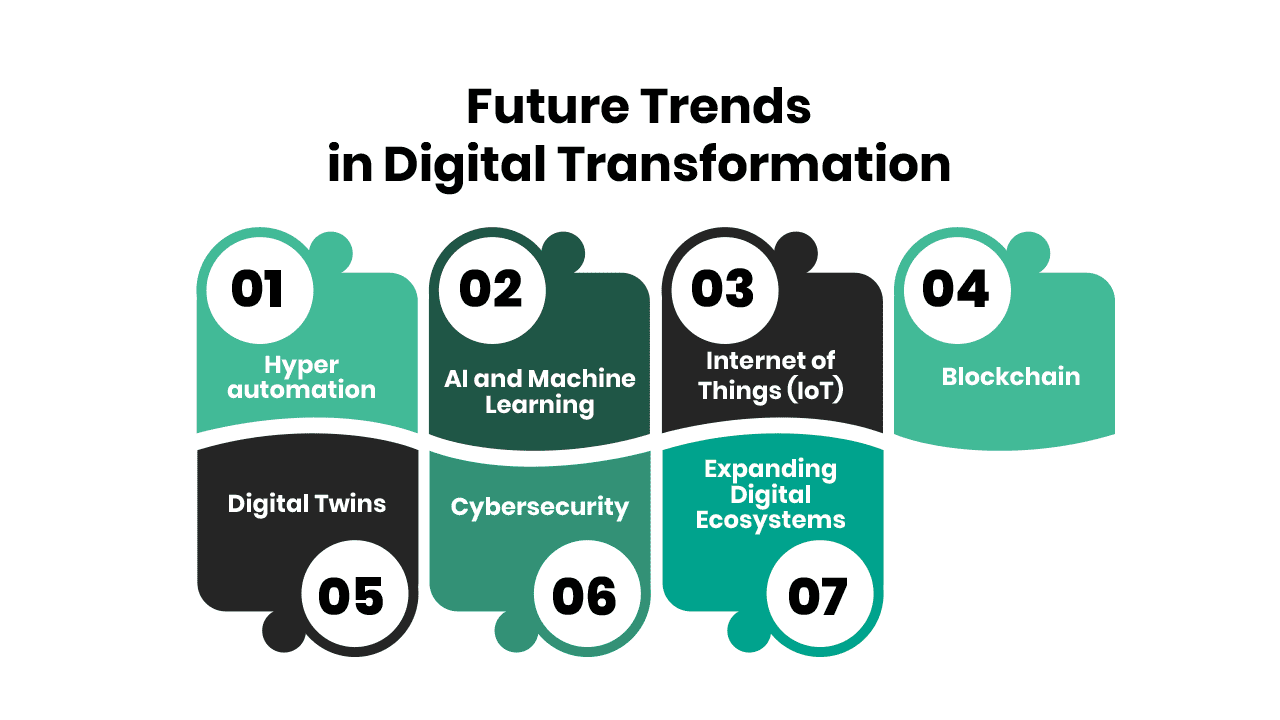The digital age has ushered in remarkable transformations across industries, fundamentally altering how we communicate and conduct business. The digital wave has reshaped traditional business models, making digital transformation a critical driver of this revolution. At the heart of this shift is digital transformation, which is no longer a luxury but a necessity for businesses seeking success in today’s fast-paced environment.
The business world is undergoing a seismic shift driven by evolving consumer expectations and rapid technological advancements. As companies grapple with this new reality, digital transformation has emerged as a game changer, redefining organisations’ operations and engagement with their customers. This crucial journey empowers businesses to leverage cutting-edge tools and strategies, fostering innovation and driving operational efficiencies.
Digital transformation is indispensable for businesses in today’s landscape, enabling organisations to adapt to rapidly evolving market conditions, maintain competitiveness, and meet the growing demands of customers. It involves seamlessly integrating digital technologies into all aspects of a company’s operations, resulting in a fundamental shift in its functioning.
According to Gartner, nearly half (47%) of CEOs across 15 global industries have been urged by their boards to transition toward digital business. Additionally, 56% of those CEOs reported increased profits after implementing digital improvements. These figures highlight that most industries now acknowledge the significance of digital transformation and are proactively adapting to stay competitive.
Why Is Digital Transformation Important?
With Digital transformation emerging as a pivotal force in contemporary business, empowering organisations to navigate the dynamic technological landscape, embrace innovation and remain competitive. By successfully and effectively integrating digital tools and platforms, businesses can significantly enhance efficiency, meet customer demands more effectively, and sustain a competitive edge in the ever-expanding global marketplace. For businesses to thrive in the modern era, the need to embrace digital transformation is mandatory due to several key reasons:
1. Enhanced Customer Experience:
Customers today expect seamless, personalised, and efficient interactions across digital platforms. Digital transformation enables businesses to leverage data analytics, artificial intelligence, and automation to provide superior customer experiences that enhance customer satisfaction and strengthen brand loyalty. Key benefits for enhancing customer experience include:
- Personalisation: Digital tools allow businesses to tailor products and services to individual customer preferences, improving satisfaction.
- Accessibility: Online platforms and mobile apps provide 24/7 access, making it easier for customers to engage with the brand.
- Efficient Support: Chatbots and virtual assistants can provide instant customer support, reducing wait times.
2. Operational Efficiency:
Digital transformation fosters innovation by allowing companies to experiment with new products, services, and business models. It also helps businesses stay ahead of competitors by offering faster go-to-market strategies and by creating new revenue streams through technologies such as e-commerce, IoT, and AI-driven services. Below are the key benefits of digital transformation in these areas:
- Automation: Automating repetitive tasks streamlines processes, reduces errors, and increases productivity.
- Data-Driven Decisions: Analysing data provides valuable insights to inform strategic decisions and optimise operations.
- Supply Chain Management: Digital tools improve supply chain visibility, reducing costs and minimising disruptions.
3. Innovation and Competitive Advantage:
Digital transformation fosters innovation by allowing companies to experiment with new products, services, and business models. It also helps businesses stay ahead of competitors by offering faster go-to-market strategies and by creating new revenue streams through technologies such as e-commerce, IoT, and AI-driven services. The primary advantages are highlighted in the following areas:
- New Products and Services: Digital technologies enable the development of innovative products and services that meet evolving customer needs.
- Market Expansion: Online platforms allow businesses to reach a global audience, expanding their market reach.
- Cost Reduction: Digital transformation can lead to cost savings through process optimisation and reduced overhead.
4. Improved Decision Making:
As companies integrate digital technologies, they become more sustainable by reducing waste and optimising resources. Additionally, digital transformation helps future-proof businesses by ensuring they stay competitive in a rapidly changing technological environment. Key benefits include:
- Real-time Data: Access to real-time data allows businesses to make informed decisions quickly.
- Predictive Analytics: Using data to predict future trends helps businesses anticipate challenges and opportunities.
5. Resilience and Adaptability:
Digital transformation enables businesses to improve collaboration across teams and locations through cloud-based tools, real-time messaging, and virtual workspaces. As remote work becomes more common, these tools ensure that businesses can maintain productivity and communication regardless of physical location.
Overcoming the Challenges of Digital Transformation
Effective and successful adoption of digital transformation requires a strategic approach. While the benefits of digital transformation are substantial, the journey is not without its challenges:
Common Challenges:
- Resistance to Change: Employees who are accustomed to traditional methods may resist the adoption of new technologies.
- Security Concerns: As operations move online, businesses face increased cybersecurity threats.
- Implementation Hurdles: Integrating new technologies into existing systems can be complex and time-consuming.
Navigating the Challenges:
To address these challenges, businesses must foster a culture of adaptability, invest in employee development and training, and carefully plan the integration of new technologies. With strong leadership, clear goals, and the right support systems in place, organisations can successfully navigate these challenges and unlock the full potential of digital transformation.
To successfully overcome these challenges, businesses need to:
- Develop a Clear Strategy: A well-defined digital transformation strategy outlines the goals, timeline, and resource allocation.
- Invest in Training: Provide ongoing training programs to help employees adapt to new technologies and processes.
- Prioritise Cybersecurity: Implement robust cybersecurity measures to protect sensitive data and mitigate risks.
By addressing these challenges proactively, businesses can maximise the benefits of digital transformation and achieve long-term success.
Future Trends in Digital Transformation
As technology continues to evolve at a rapid pace, digital transformation is set to undergo significant shifts in the coming years. Here are some key trends to watch:
1. Hyper automation:
Hyper automation, driven by intelligent automation and Robotic Process Automation (RPA), is poised to revolutionise business operations. By combining artificial intelligence (AI) and machine learning, businesses can automate even complex tasks, leading to significant improvements in efficiency and productivity. RPA technology will become increasingly sophisticated, capable of handling a wider range of tasks and integrating seamlessly with other systems. Hyper automation offers businesses the opportunity to streamline processes, reduce costs, and free up human resources for more strategic and creative endeavours.
2. AI and Machine Learning:
Learning is set to become even more sophisticated, revolutionising industries through generative AI and edge AI. Generative AI models will increasingly be capable of generating creative content, such as text, images, and code, transforming industries like marketing and design. Edge AI, which shifts AI processing closer to the data source, will enable real-time decision-making in applications like autonomous vehicles and IoT devices. As learning continues to advance, its impact on various industries will only grow, driving innovation and transforming the way we work and live.
3. Internet of Things (IoT):
The advancements in edge computing and 5G connectivity. Edge computing enables IoT devices to process data locally, reducing latency and improving response times. 5G networks provide faster data transfer speeds and lower latency, supporting more advanced IoT applications. By leveraging these technologies, IoT devices will become more powerful and capable, enabling a wide range of innovative applications across various industries.
4. Blockchain:
Blockchain technology, once primarily associated with cryptocurrencies, is poised to expand into various industries. Applications in supply chain management, healthcare, and voting systems are just a few examples of how blockchain can revolutionise operations. Blockchain’s ability to provide secure, transparent, and immutable records makes it a valuable technology in these critical areas. Additionally, decentralised finance (DeFi) platforms are gaining popularity, offering decentralised financial services without intermediaries, further demonstrating the versatility of blockchain technology.
5. Digital Twins:
Digital twins, virtual representations of physical assets, will become increasingly valuable in various industries. These digital replicas can be used for predictive maintenance, optimising operations, and conducting simulations. By creating digital twins, businesses can gain valuable insights into the performance of their assets, identify potential issues before they occur, and improve overall efficiency. Additionally, the convergence of digital twins and augmented reality will create immersive virtual environments, facilitating training, collaboration, and product design.
6. Cybersecurity:
Cybersecurity will become increasingly important as businesses face evolving threats. To protect sensitive data and systems, businesses will need to adopt a zero-trust approach to security, assuming that any network access is potentially malicious. Additionally, AI-powered threat detection will be crucial for identifying and responding to advanced cyber threats in real time. By investing in robust cybersecurity measures, businesses can mitigate risks and protect their operations.
These trends are likely to shape the future of digital transformation, driving innovation and transforming industries across the globe. Businesses that can overcome digital resistance and leverage on modern technologies will be well-positioned to succeed in the digital age.
7. Expanding Digital Ecosystems:
As businesses continue to digitize, the ecosystem of digital tools and platforms will grow. This trend emphasises the importance of digital transformation in business, as well as the need for firms to be nimble and adaptable.
We at pcl. offer courses to assist businesses improve their digital experience. Our courses give thorough training on a wide range of digital topics, including digital strategy, data analytics, cloud computing, artificial intelligence, cybersecurity, and digital marketing.
By registering for our courses, businesses will receive the knowledge and skills required to handle the difficulties of digital transformation and prosper in the new business landscape.
Conclusion
In today’s fast-paced digital world, standing still is like playing catch-up. Digital transformation might be a challenge, but it’s a must if you want to stay in the game. By jumping on the digital bandwagon, companies aren’t just keeping up; they’re setting themselves up for success in the future.
Written by:
Onyinyechukwu Kene-Mbuba
Analyst
![]()


